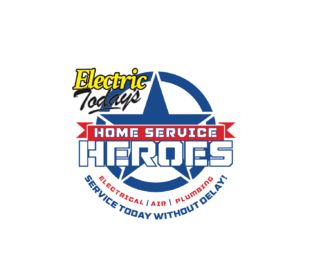Ah, there it goes again! All you’re trying to do is to heat up your Hot Pockets for lunch, and everything was going great until you pressed the “start” button on the microwave. All of a sudden, the lights to everything went out – your circuit breaker tripped. When this happens once, it’s a mild annoyance. All it takes is a quick trip to the breaker box to flip the switch, and you’re back in business. But when it happens again and again and again, you might have a problem with your hands.
Tripping a circuit breaker never fails to be incredibly irritating, but there’s a silver lining to it: all you have to do is push the level back, so the circuit breaker is doing its job! Without it, the factors that keep causing your breaker to trip could have led to a much more serious problem such as sparking, which could eventually become something as dangerous as a fire. Let Home Service Heroes guide you through the most common reasons your circuit breaker is tripping, and what you can do to make sure it doesn’t keep happening.
Circuit Overloads
This one is arguably the most common culprit behind a tripped breaker. When a circuit has too many devices or appliances plugged into it – and thus has an influx of power that it isn’t equipped to handle – it overloads, and the breaker trips. The wires holding the current start channeling too much heat, and the breaker does what it has to do to prevent them from overheating and causing a disaster.
The solution here is pretty simple. If possible, find a way to re-arrange your devices in a way that lessens the burden on specific outlets or power strips. Divvy up the load, and the overload problem stands a better shot of going away.
Ground Faults
When a hot wire gets loose and creates a circuit with something else – like a metal box – then it produces a ground fault. The current finds a quicker way than intended to complete the circuit, and the wires can’t handle that sudden influx of power, and the breaker trips.
A culprit here could be because some of the wires – or the outlet – might be loose or improperly installed. If you’re electrically inclined, you can attempt to check the wiring yourself, but that makes for a dangerous task. An electrician will be able to diagnose the problem.
Short Circuits
A short circuit is essentially what a ground fault is, except that these short circuits happen in an isolated environment. If hot wire jars lose and connect with another wire, the circuit gets turned on itself. If your outlets are charred or burned, you’re seeing telltale signs a short circuit has shown up.
Again, like with a ground fault, we don’t advise you to try and tackle this problem yourself except in very rare cases. Let a trained professional handle it.
Tripped breakers are annoying, but with a few quick inspections, you should be able to determine what the underlying problem is. If you’ve run through every test you can think of and you still haven’t deciphered the issue, give Home Service Heroes a call at (813) 696-3398 to have one of our expert technicians come to take a look!
